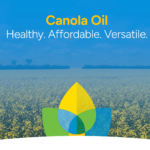|
Canola Quick Bytes
A supplement to U.S. Canola Digest
Capitol Hill
The U.S. Canola Association (USCA) signed onto two advocacy letters of importance last week regarding pesticide labels. The first supports a petition from state attorney generals requesting rulemaking to prevent states from requiring pesticide labels that conflict with Environmental Protection Agency (EPA) safety findings. This rulemaking would ensure clear, consistent and science-based labeling, protecting both farmers and consumers while maintaining regulatory certainty. The second letter urges Congress to enact the Agricultural Labeling Uniformity Act to ensure that pesticide labeling remains consistent with EPA-approved, science-based guidelines. This is in response to some states imposing conflicting pesticide labels that could disrupt commerce, undermine public confidence and jeopardize access to vital agricultural tools.
 The USCA, Clean Fuels Alliance America, American Farm Bureau Federation, American Soybean Association, National Oilseed Processors Association and North American Renderers Association sent a letter on March 17 to Environmental Protection Agency Administrator Lee Zeldin encouraging the agency to establish timely, significant Renewable Fuel Standard volumes for 2026 and beyond, starting at 5.25 billion gallons. The USCA, Clean Fuels Alliance America, American Farm Bureau Federation, American Soybean Association, National Oilseed Processors Association and North American Renderers Association sent a letter on March 17 to Environmental Protection Agency Administrator Lee Zeldin encouraging the agency to establish timely, significant Renewable Fuel Standard volumes for 2026 and beyond, starting at 5.25 billion gallons.
The U.S. Department of Agriculture’s Farm Service Agency (USDA’s FSA) announced on March 19 information about the Emergency Commodity Assistance Program (ECAP), which was enacted by Congress last December to help commodity producers mitigate the impacts of increased input costs and falling prices. The payment rate for canola is $31.83 per acre, slightly higher than previous estimates. Applications must be submitted by Aug. 15, 2025. Producers who did not receive a pre-filled ECAP application in the mail should contact their local FSA office.
 U.S. Senators John Hoeven and Amy Klobuchar reintroduced the bipartisan Producer and Agricultural Credit Enhancement (PACE) Act to modernize and expand USDA loan programs, making it easier for farmers to access credit amid rising agricultural costs, noted KFGO radio. The legislation, which they aim to include in the next farm bill, increases loan limits for FSA direct and guaranteed loan programs, updates inflation benchmarks and creates refinancing options for distressed borrowers. Supported by a wide range of agricultural organizations, including the USCA, the PACE Act seeks to strengthen the rural economy, support beginning farmers, and provide vital financial tools to help producers navigate economic challenges and maintain viable operations. U.S. Senators John Hoeven and Amy Klobuchar reintroduced the bipartisan Producer and Agricultural Credit Enhancement (PACE) Act to modernize and expand USDA loan programs, making it easier for farmers to access credit amid rising agricultural costs, noted KFGO radio. The legislation, which they aim to include in the next farm bill, increases loan limits for FSA direct and guaranteed loan programs, updates inflation benchmarks and creates refinancing options for distressed borrowers. Supported by a wide range of agricultural organizations, including the USCA, the PACE Act seeks to strengthen the rural economy, support beginning farmers, and provide vital financial tools to help producers navigate economic challenges and maintain viable operations.
Agronomy
 Researchers from Australia’s New South Wales (NSW) Department of Primary Industries and Regional Development (DPIRD) have identified a gene that enables canola plants to tolerate manganese toxicity in acidic soils, a breakthrough that could boost productivity in challenging growing conditions. Acidic soils, which impact 13.7 million hectares in NSW alone, pose a major threat to crops like canola by limiting growth and reducing yields. After five years of research, NSW DPIRD successfully cloned the gene responsible for manganese tolerance and uncovered genetic networks influencing this trait. This discovery paves the way for developing resilient canola varieties that can thrive in acidic soils, reducing reliance on lime applications and offering farmers higher yields and improved profitability. The project was supported by several international and Australian research organizations. Researchers from Australia’s New South Wales (NSW) Department of Primary Industries and Regional Development (DPIRD) have identified a gene that enables canola plants to tolerate manganese toxicity in acidic soils, a breakthrough that could boost productivity in challenging growing conditions. Acidic soils, which impact 13.7 million hectares in NSW alone, pose a major threat to crops like canola by limiting growth and reducing yields. After five years of research, NSW DPIRD successfully cloned the gene responsible for manganese tolerance and uncovered genetic networks influencing this trait. This discovery paves the way for developing resilient canola varieties that can thrive in acidic soils, reducing reliance on lime applications and offering farmers higher yields and improved profitability. The project was supported by several international and Australian research organizations.
 Picketa Systems, a Canadian ag-tech company, has expanded its LENS (Leaf Evaluated Nutrient System) platform to include canola, bringing real-time tissue analysis to North America’s canola growers. After successful applications in potatoes and corn, the LENS uses AI and pattern recognition to measure nutrient concentrations in under a minute, enabling precise, in-season nutrient management. Partnering with Cargill, Picketa is piloting the technology in Camrose, Alberta, to enhance agronomic strategies, input efficiency and sustainable farming practices. Field trials across the Americas have validated the canola model and Picketa plans to continue refining its accuracy through grower feedback. Picketa Systems, a Canadian ag-tech company, has expanded its LENS (Leaf Evaluated Nutrient System) platform to include canola, bringing real-time tissue analysis to North America’s canola growers. After successful applications in potatoes and corn, the LENS uses AI and pattern recognition to measure nutrient concentrations in under a minute, enabling precise, in-season nutrient management. Partnering with Cargill, Picketa is piloting the technology in Camrose, Alberta, to enhance agronomic strategies, input efficiency and sustainable farming practices. Field trials across the Americas have validated the canola model and Picketa plans to continue refining its accuracy through grower feedback.
The annual BeSure! campaign by Growing Matters reminds farmers of good stewardship practices with neonicotinoid products to protect bees.
 Field to Market is seeking member feedback on its draft Regenerative Agriculture Guidance until April 10, 2025. This guidance aims to provide a strategic framework for implementing regenerative agriculture using the Fieldprint® Project Standard and Platform, focusing on environmental, economic and social impacts. It will be finalized after member input and presented for approval at the organization’s annual meeting in June 2025. More information about the guidance is in this webinar recording. Additionally, Field to Market is requesting comments by April 10 on proposed revisions to its Energy Use, GHG Emissions and Soil Carbon metrics. The USCA will gather input on both subjects to submit comments. Field to Market is seeking member feedback on its draft Regenerative Agriculture Guidance until April 10, 2025. This guidance aims to provide a strategic framework for implementing regenerative agriculture using the Fieldprint® Project Standard and Platform, focusing on environmental, economic and social impacts. It will be finalized after member input and presented for approval at the organization’s annual meeting in June 2025. More information about the guidance is in this webinar recording. Additionally, Field to Market is requesting comments by April 10 on proposed revisions to its Energy Use, GHG Emissions and Soil Carbon metrics. The USCA will gather input on both subjects to submit comments.
The USDA’s National Agricultural Service issued its annual Prospective Plantings report on March 31. Intended canola plantings for 2025 are 2.57 million acres, including more than 2 million acres in North Dakota, 165,000 in Montana and Washington, 85,000 in Idaho, 75,000 in Minnesota, 16,000 in Oklahoma and 10,000 in Kansas. Nationwide plantings are down 7% from last year’s record high planted area, but they will be the second most on record if realized. Planted area is down in five of the seven major canola-producing states, with only Kansas and Washington showing an increase. Planted area in Washington will be a record high if realized. Planted area in North Dakota is forecast to be down 4% from last year.
Nutrition
The American Heart Association (AHA) reminds everyone that dietary choices are the foundation of a heart-healthy lifestyle. It advises consuming liquid non-tropical plant oils that contain less than 4 grams of saturated fat per tablespoon like canola instead of butter, shortening or tropical oils (i.e., palm and coconut), which contain much more saturated fat. Replacing “bad” saturated and trans fats with “good” monounsaturated and polyunsaturated fats supports heart health. A simple way to identify heart-healthy food products is by looking for the AHA Heart-Check Mark™, such as on canola oil.
 A new study in JAMA Internal Medicine, “Butter and Plant-Based Oils Intake and Mortality,” concluded that substituting butter with vegetable oils, particularly canola, olive and soybean, may reduce the risk of premature death. It analyzed 30+ years of data for more than 200,000 U.S. adults. “Our study found that higher butter intake was associated with increased deaths from all causes and cancer, while higher intake of plant-based oils was associated with lower deaths from all causes, cancer and cardiovascular disease,” said lead study author Yu Zhang, a graduate student at Harvard T.H. Chan School of Public Health, in an American Heart Association news release. Participants who replaced just a tablespoon of total butter each day with an equivalent amount of total plant-based oils had a 17% reduction in risk of death from all causes as well as from cancer. “Olive oil, canola oil, and soybean oil were each more consistently associated with benefit: a lower risk of dying,” added cardiologist Dr. Dariush Mozaffarian, director of the Food is Medicine Institute at Tufts University, on CNN.com. “These findings add to a large body of scientific literature on the health benefits of these plant oils, whose positive effects have been demonstrated in both large observational studies and dozens of randomized trials.” A new study in JAMA Internal Medicine, “Butter and Plant-Based Oils Intake and Mortality,” concluded that substituting butter with vegetable oils, particularly canola, olive and soybean, may reduce the risk of premature death. It analyzed 30+ years of data for more than 200,000 U.S. adults. “Our study found that higher butter intake was associated with increased deaths from all causes and cancer, while higher intake of plant-based oils was associated with lower deaths from all causes, cancer and cardiovascular disease,” said lead study author Yu Zhang, a graduate student at Harvard T.H. Chan School of Public Health, in an American Heart Association news release. Participants who replaced just a tablespoon of total butter each day with an equivalent amount of total plant-based oils had a 17% reduction in risk of death from all causes as well as from cancer. “Olive oil, canola oil, and soybean oil were each more consistently associated with benefit: a lower risk of dying,” added cardiologist Dr. Dariush Mozaffarian, director of the Food is Medicine Institute at Tufts University, on CNN.com. “These findings add to a large body of scientific literature on the health benefits of these plant oils, whose positive effects have been demonstrated in both large observational studies and dozens of randomized trials.”
 Seed oils have become a hot topic in health conversations, particularly on social media, with plenty of questions—and sometimes confusion—about their role in the diet. Are they good for you? Science says a resounding “YES.” Read more in this month’s USCA Blog, “Seed Oils & Health: Fact vs. Fiction,” by outgoing USCA Director of Communications Angela Dansby. Also, check out the USCA web page about seed oils and health, including information about composition, expert recommendations and scientific evidence as well as resources. Seed oils have become a hot topic in health conversations, particularly on social media, with plenty of questions—and sometimes confusion—about their role in the diet. Are they good for you? Science says a resounding “YES.” Read more in this month’s USCA Blog, “Seed Oils & Health: Fact vs. Fiction,” by outgoing USCA Director of Communications Angela Dansby. Also, check out the USCA web page about seed oils and health, including information about composition, expert recommendations and scientific evidence as well as resources.
In a comparison between olive and canola oils, Registered Dietitian Angel Luk explained on TheDailyMeal.com that canola oil is generally the healthier choice for everyday cooking due to its lower saturated fat content (7% versus olive oil’s 14%) and high plant-based omega-3 fat. It’s also budget-friendly and has a neutral flavor.
Other Countries
 On March 4, the Trump Administration began applying a 25% tariff to Canadian imports, including canola seed, oil and meal. America is Canada’s number one market for canola exports, with a value of $7.7 billion in 2024 alone. Canola is the single largest contributor to Canadian farm crop cash receipts, grown by nearly 40,000 farmers. “The damaging blow caused by tariffs will be felt by every canola farmer,” says Rick White, president & CEO of the Canadian Canola Growers Association. Canadian-grown canola also benefits the U.S. economy via domestic processing, refining, transport, bottling, packing, food end uses, livestock and more valued at $11.2 billion per year, including $1.2 billion in wages. “The canola industry delivers a true win-win for both Canada and the U.S., and we must do everything we can to restore smooth, predictable, tariff-free canola trade between our two countries,” said White and Chris Davison, president & CEO of the Canola Council of Canada. On March 4, the Trump Administration began applying a 25% tariff to Canadian imports, including canola seed, oil and meal. America is Canada’s number one market for canola exports, with a value of $7.7 billion in 2024 alone. Canola is the single largest contributor to Canadian farm crop cash receipts, grown by nearly 40,000 farmers. “The damaging blow caused by tariffs will be felt by every canola farmer,” says Rick White, president & CEO of the Canadian Canola Growers Association. Canadian-grown canola also benefits the U.S. economy via domestic processing, refining, transport, bottling, packing, food end uses, livestock and more valued at $11.2 billion per year, including $1.2 billion in wages. “The canola industry delivers a true win-win for both Canada and the U.S., and we must do everything we can to restore smooth, predictable, tariff-free canola trade between our two countries,” said White and Chris Davison, president & CEO of the Canola Council of Canada.
 China began imposing 100% retaliatory tariffs on Canadian canola oil and meal as of March 20, creating significant uncertainty for farmers already facing challenges from U.S. tariffs, reported The Producer. These new measures are a response to Canada’s tariffs on Chinese electric vehicles and other products. While the tariffs on canola oil may have limited economic impact due to low export volumes, those on canola meal could lower prices and profitability for farmers, pressuring them to cut costs. Industry leaders warn that continued trade tensions could further damage the canola sector, which plays a vital role in Canada’s economy. Farmers and industry groups like the Canola Council of Canada are calling for federal support and more strategic trade negotiations to protect their livelihoods. China began imposing 100% retaliatory tariffs on Canadian canola oil and meal as of March 20, creating significant uncertainty for farmers already facing challenges from U.S. tariffs, reported The Producer. These new measures are a response to Canada’s tariffs on Chinese electric vehicles and other products. While the tariffs on canola oil may have limited economic impact due to low export volumes, those on canola meal could lower prices and profitability for farmers, pressuring them to cut costs. Industry leaders warn that continued trade tensions could further damage the canola sector, which plays a vital role in Canada’s economy. Farmers and industry groups like the Canola Council of Canada are calling for federal support and more strategic trade negotiations to protect their livelihoods.
 Canola remains a key crop in southern Australia rotations, helping buffer its planting area from major declines despite global market disruptions caused by tariffs on Canadian canola products, reported GrainCentral.com. While genetically modified (GM) canola prices are feeling the most pressure—especially in Western Australia where it dominates plantings—growers are maintaining canola in their rotations due to its agronomic benefits. Canada’s inability to sell GM canola oil and meal into the United States and China due to new tariffs is creating global pricing uncertainty, with Australian non-GM canola holding stronger value in Europe. Canola remains a key crop in southern Australia rotations, helping buffer its planting area from major declines despite global market disruptions caused by tariffs on Canadian canola products, reported GrainCentral.com. While genetically modified (GM) canola prices are feeling the most pressure—especially in Western Australia where it dominates plantings—growers are maintaining canola in their rotations due to its agronomic benefits. Canada’s inability to sell GM canola oil and meal into the United States and China due to new tariffs is creating global pricing uncertainty, with Australian non-GM canola holding stronger value in Europe.
At its annual general meeting on March 6, the Canola Council of Canada announced its board of directors for 2025-26 and presented its 2024 annual report “Rooted in Resilience.” The latter highlighted collaborating on production challenges; advancing canola research; advocating for stable, open trade; addressing market access for biofuels; highlighting the need for supply chain reliability; pursuing competitive policies; and connecting with key markets on canola’s contributions to healthy diets and livestock productivity.
Latest from Industry
 The North American biofuels sector is contracting as U.S. and Canadian producers scale back operations amid uncertainty over U.S. trade policy and green fuel subsidies, notes Reuters. New tariffs and unclear regulations, particularly regarding biofuel tax credits and volume mandates, are driving up feedstock costs and depressing prices for crops like canola and soybeans. Several biofuel projects have been suspended, and production has slowed, leading to idled plants and weakened demand for oilseeds. This instability threatens the gains made by the biofuels industry in supporting rural economies and decarbonization efforts, with companies like ADM and Bunge warning of declining profits in 2025. The North American biofuels sector is contracting as U.S. and Canadian producers scale back operations amid uncertainty over U.S. trade policy and green fuel subsidies, notes Reuters. New tariffs and unclear regulations, particularly regarding biofuel tax credits and volume mandates, are driving up feedstock costs and depressing prices for crops like canola and soybeans. Several biofuel projects have been suspended, and production has slowed, leading to idled plants and weakened demand for oilseeds. This instability threatens the gains made by the biofuels industry in supporting rural economies and decarbonization efforts, with companies like ADM and Bunge warning of declining profits in 2025.
The National Oilseed Processors Association (NOPA) announced key policy priorities for 2025, focusing on supporting American farmers, boosting U.S.-grown biofuels and strengthening the U.S. economy. NOPA aims to increase Renewable Fuel Standard volumes to match expanding industry capacity, secure biofuel tax credits favoring U.S. crops and limit the surge of imported feedstocks like used cooking oil and tallow that undercut domestic producers. It also advocates for food security through increased production of protein-rich meal and vegetable oils as well as for science-based food policies that recognize the nutritional benefits of seed oils. Additionally, NOPA seeks to ensure clean fuel programs reflect the lower carbon intensity of U.S. agricultural feedstocks to support sustainable biofuel growth.
 CanolaInfo.org, featuring nutrition and culinary information about canola oil from the Canola Council of Canada, got a facelift. Information is up-to-date and easier to find. The website is available in English and Spanish. CanolaInfo.org, featuring nutrition and culinary information about canola oil from the Canola Council of Canada, got a facelift. Information is up-to-date and easier to find. The website is available in English and Spanish.
The Pacific Northwest Canola Association (PNWCA) is planning several winter and spring canola field tours in May, June and July and collaborating with the Idaho Grain Producers Association, Oregon Wheat Growers League and Idaho Oilseed Commission for the first-ever Idaho Grain & Oilseed Convention, Nov. 18-20, 2025 in Sun Valley, Idaho. The PNWCA is also holding a new monthly photo contest for its members, focusing on regional canola production.
About the USCA
 The spring 2025 board and membership meeting in Washington, D.C., March 17-19 featured guest speakers Manning Feraci of Playmaker Strategies on the 45Z Clean Fuel Production Tax Credit; Troy Sherman of the Canola Council of Canada and Chris Vervaet of the Canadian Oilseed Processors Association on tariffs and other issues; Alexis Settineri of Food Directions on seed oil messaging and strategy; and Rod Snyder of Junction Strategies on comments the USCA recently submitted on the Climate Smart Agriculture Interim Rule. Presentations were followed by visits with U.S. Senators and Representatives to discuss the USCA’s 2025 policy priorities, including trade and tariffs, biofuels, seed oils and the farm bill. The meeting concluded with a joint reception on Capitol Hill with the National Oilseed Processors Association and American Soybean Association. The USCA fall board meeting will be in San Antonio, Texas, in November. (Photo: Mick Miller, Keith Horton and Dale Flikkema representing the Pacific Northwest Association.) The spring 2025 board and membership meeting in Washington, D.C., March 17-19 featured guest speakers Manning Feraci of Playmaker Strategies on the 45Z Clean Fuel Production Tax Credit; Troy Sherman of the Canola Council of Canada and Chris Vervaet of the Canadian Oilseed Processors Association on tariffs and other issues; Alexis Settineri of Food Directions on seed oil messaging and strategy; and Rod Snyder of Junction Strategies on comments the USCA recently submitted on the Climate Smart Agriculture Interim Rule. Presentations were followed by visits with U.S. Senators and Representatives to discuss the USCA’s 2025 policy priorities, including trade and tariffs, biofuels, seed oils and the farm bill. The meeting concluded with a joint reception on Capitol Hill with the National Oilseed Processors Association and American Soybean Association. The USCA fall board meeting will be in San Antonio, Texas, in November. (Photo: Mick Miller, Keith Horton and Dale Flikkema representing the Pacific Northwest Association.)
Get social with us on Instagram, LinkedIn, Facebook, Twitter and YouTube.
Want to promote your products or services to canola producers and industry members? Visit our advertising pages to find specs, deadlines and rates to advertise in this monthly e-newsletter or on UScanola.com.
|
 The USCA, Clean Fuels Alliance America, American Farm Bureau Federation, American Soybean Association, National Oilseed Processors Association and North American Renderers Association sent a letter on March 17 to Environmental Protection Agency Administrator Lee Zeldin encouraging the agency to establish timely, significant Renewable Fuel Standard volumes for 2026 and beyond, starting at 5.25 billion gallons.
The USCA, Clean Fuels Alliance America, American Farm Bureau Federation, American Soybean Association, National Oilseed Processors Association and North American Renderers Association sent a letter on March 17 to Environmental Protection Agency Administrator Lee Zeldin encouraging the agency to establish timely, significant Renewable Fuel Standard volumes for 2026 and beyond, starting at 5.25 billion gallons. U.S. Senators John Hoeven and Amy Klobuchar reintroduced the bipartisan Producer and Agricultural Credit Enhancement (PACE) Act to modernize and expand USDA loan programs, making it easier for farmers to access credit amid rising agricultural costs, noted KFGO radio. The legislation, which they aim to include in the next farm bill, increases loan limits for FSA direct and guaranteed loan programs, updates inflation benchmarks and creates refinancing options for distressed borrowers. Supported by a wide range of agricultural organizations, including the USCA, the PACE Act seeks to strengthen the rural economy, support beginning farmers, and provide vital financial tools to help producers navigate economic challenges and maintain viable operations.
U.S. Senators John Hoeven and Amy Klobuchar reintroduced the bipartisan Producer and Agricultural Credit Enhancement (PACE) Act to modernize and expand USDA loan programs, making it easier for farmers to access credit amid rising agricultural costs, noted KFGO radio. The legislation, which they aim to include in the next farm bill, increases loan limits for FSA direct and guaranteed loan programs, updates inflation benchmarks and creates refinancing options for distressed borrowers. Supported by a wide range of agricultural organizations, including the USCA, the PACE Act seeks to strengthen the rural economy, support beginning farmers, and provide vital financial tools to help producers navigate economic challenges and maintain viable operations.

 Researchers from
Researchers from  Picketa Systems
Picketa Systems Field to Market is seeking member feedback on its
Field to Market is seeking member feedback on its  A new study in
A new study in  Seed oils have become a hot topic in health conversations, particularly on social media, with plenty of questions—and sometimes confusion—about their role in the diet. Are they good for you? Science says a resounding “YES.” Read more in this month’s
Seed oils have become a hot topic in health conversations, particularly on social media, with plenty of questions—and sometimes confusion—about their role in the diet. Are they good for you? Science says a resounding “YES.” Read more in this month’s  On March 4, the Trump Administration began applying a 25% tariff to Canadian imports, including canola seed, oil and meal. America is Canada’s number one market for canola exports, with a value of $7.7 billion in 2024 alone. Canola is the single largest contributor to Canadian farm crop cash receipts, grown by nearly 40,000 farmers. “The damaging blow caused by tariffs will be felt by every canola farmer,” says Rick White, president & CEO of the
On March 4, the Trump Administration began applying a 25% tariff to Canadian imports, including canola seed, oil and meal. America is Canada’s number one market for canola exports, with a value of $7.7 billion in 2024 alone. Canola is the single largest contributor to Canadian farm crop cash receipts, grown by nearly 40,000 farmers. “The damaging blow caused by tariffs will be felt by every canola farmer,” says Rick White, president & CEO of the  China began imposing 100% retaliatory tariffs on Canadian canola oil and meal as of March 20, creating significant uncertainty for farmers already facing challenges from U.S. tariffs, reported
China began imposing 100% retaliatory tariffs on Canadian canola oil and meal as of March 20, creating significant uncertainty for farmers already facing challenges from U.S. tariffs, reported  Canola remains a key crop in southern Australia rotations, helping buffer its planting area from major declines despite global market disruptions caused by tariffs on Canadian canola products, reported
Canola remains a key crop in southern Australia rotations, helping buffer its planting area from major declines despite global market disruptions caused by tariffs on Canadian canola products, reported  The North American biofuels sector is contracting as U.S. and Canadian producers scale back operations amid uncertainty over U.S. trade policy and green fuel subsidies, notes
The North American biofuels sector is contracting as U.S. and Canadian producers scale back operations amid uncertainty over U.S. trade policy and green fuel subsidies, notes  CanolaInfo.org
CanolaInfo.org The spring 2025 board and membership meeting in Washington, D.C., March 17-19 featured guest speakers Manning Feraci of Playmaker Strategies on the 45Z Clean Fuel Production Tax Credit; Troy Sherman of the Canola Council of Canada and Chris Vervaet of the Canadian Oilseed Processors Association on tariffs and other issues; Alexis Settineri of Food Directions on seed oil messaging and strategy; and Rod Snyder of Junction Strategies on comments the USCA recently submitted on the Climate Smart Agriculture Interim Rule. Presentations were followed by visits with U.S. Senators and Representatives to discuss the USCA’s
The spring 2025 board and membership meeting in Washington, D.C., March 17-19 featured guest speakers Manning Feraci of Playmaker Strategies on the 45Z Clean Fuel Production Tax Credit; Troy Sherman of the Canola Council of Canada and Chris Vervaet of the Canadian Oilseed Processors Association on tariffs and other issues; Alexis Settineri of Food Directions on seed oil messaging and strategy; and Rod Snyder of Junction Strategies on comments the USCA recently submitted on the Climate Smart Agriculture Interim Rule. Presentations were followed by visits with U.S. Senators and Representatives to discuss the USCA’s